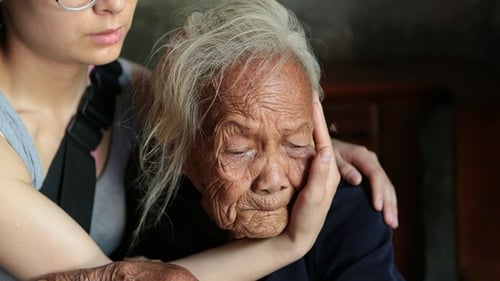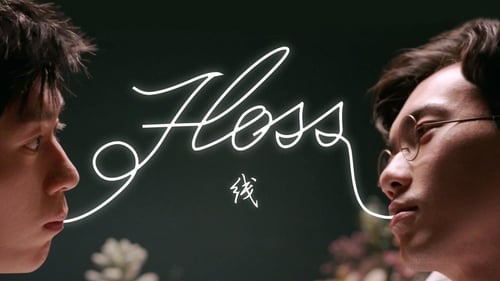Survival Song (2008)
ジャンル : ドキュメンタリー
上映時間 : 1時間 34分
演出 : 于广义
シノプシス
Documentary about a man called Xiaolizi.

A soon-to-be first-time voter, the filmmaker’s thought-provoking journey into the Rust Belt and South captures four Asian American voters’ ardent first time grassroots political participation ignited by the 2016 rise of “Chinese Americans for Trump.” FIRST VOTE is a character driven cinema verité style film chronicling the democratic participation of four Asian American voters from 2016 through the 2018 midterm elections.

Follow the lives of the elderly survivors who were forced into sex slavery as “Comfort Women” by the Japanese during World War II. At the time of filming, only 22 of these women were still alive to tell their story. Through their own personal histories and perspectives, they tell a tale that should never be forgotten to generations unaware of the brutalization that occurred.

Coming back to her broken family, pregnant writer Huang Xiaoyu and her French husband, Benjamin, finds herself trapped between her cult brainwashed mother, Li Jiumei, and her secretly homosexual father, Huang Tao.

Xuan is a young man working in the film industry in Beijing. To make a documentary film that he wants to present at international festivals, he decides to take advantage of the holidays of the Day of the Dead to return to Chengdu, his hometown located at the other end of the country. The documentary he is about to make is about his relationship with his own lover. He leaves for Chengdu, accompanied by another man, Bo, the cameraman of the film. The two men take the train to Chengdu where Hong, Xuan's lover, is waiting for them. From the first moment of their arrival at the station, Xuan and Bo begin to turn with their camera, Xuan having already explained to Bo what he wanted to film and that Hong would always be "playing", Bo then trusting in Xuan. But Hong is more and more opposed to this camera and the presence of Bo.

A shy boy, who was not good at communicating with others, saw a shining fish in a stream one day and took it home. Since then, his life has changed. The lonely little boy was getting vivacious because of the little fish. But suddenly one morning when he got up, the fish disappeared...

A highway is waiting to go through a quiet village in Hunan, a province in central China where Mao was from. Due to the high cost of construction, construction companies and migrant workers who live on road work rush to here like the tide. In the following four years, they root in this strange place for interests, paying sweat and blood, even their lives. With their arrival, local village and peasants are forced to change their lives. Many hidden interest lines and hidden rules about road construction of the nation are unveiled, together with the shocking truth and emerging secrets.

Filmed over three years on China’s railways, The Iron Ministry traces the vast interiors of a country on the move: flesh and metal, clangs and squeals, light and dark, and language and gesture. Scores of rail journeys come together into one, capturing the thrills and anxieties of social and technological transformation. The Iron Ministry immerses audiences in fleeting relationships and uneasy encounters between humans and machines on what will soon be the world’s largest railway network.

Xingxi travels alone to Alor Setar, a town in Northern Malaysia. As a consequence of a blown tire, she experiences three variant adventures. She introduces herself to people using different identities with mysterious secrets. In return, what the journey brings her is thoroughly unexpected. In the first adventure, Brooke is a traveler; in the second adventure, Brooke is an anthropologist; in the third, Brooke is a divorcée. She is a disheartened woman who comes across a French writer named Pierre. The two lonely travelers become instant friends. Their age gap enables them to have their respective insights into life and death. Meanwhile, it is not until the enigmatic side of Alor Setar begins to unfold that Brooke tells Pierre the true reason why she has come. They seek to understand the interaction between love and life. As the story comes to an end, mother nature shows her beauty with the magical Blue Tears phenomenon on prominent display.

In 1946, Heidi is entrusted to a Swiss family by her father. He will never come back for her. Today, François Yang questions his mother about her past. What follows is a journey to China, a quest to reconstruct memory. Through contact with her brothers and sister, Heidi measures the extent of the drama experienced by her family that remained in China, persecuted by the Communist Party.

It has been a month Chang's wife Ling Yue has been missing. With no reasons one fine day she went to work as usual and then never returns. No one knows where she went or what had happened to her. Chang could not figure out why she disappears out of the sudden. She left no message of whatever kind or clues. One day a man named Tong shows up and claims to be Ling Yues lover. Apparently Tong is looking for Ling Yue too. In a turn of event both men formed an uneasy alliance in order to find Ling Yue

Documentary about a tribe of indigenous people in northern China.

A policeman investigates an introverted signal-station manager suspected of raping a hotel clerk.

A documentary about government machinations and family conflict as development raises its head in an isolated country enclave of China.

ティンは新しい恋人のマークの“歯”にフェティッシュなまでの強い性的魅力を感じていた。ティンはマークにこのことを打ち明けたいと思っているが…。

A passenger on a bus, a man with a barrel on his head, and when they meet, the two worlds are connected...

In his third film on life and work in the (once) heavily wooded north of China, Yu Guangyi (Survival Song) follows the lonely San Liangzi (46), who for the past ten years has been in love with a woman who doesn’t like men much. Intimate and revealing, but never rude. A moving and human portrait of a group of unemployed and above all lonely men who stayed behind when their wives moved to the city looking for work. They worked in the timber industry in the province of Heilongjiang, but deforestation has taken its toll. For instance, we see 46-year-old San Liangzi. Twelve years ago, he divorced his wife and became unemployed. For 10 years, he has had an eye on Wang Meizi, the only unmarried woman in the area. But the love is not mutual.

A documentary chronicling the coming of age of a young chinese man.

Three scenes about three couples with each portraying maybe the turning point of their relationship. First scene, Lim & Amelia are a couple who had been together for almost five years. While he works as a salesman and trying to save up for marriage, the girl are not sure if he’s the one she wants to marry. One day he confronts her about a letter from her admirer. Second scene, Pete & Bernice are a couple who had been together almost ten years. They’re not married because he doesn’t believe in marriage. While she tags along, one day she might realizes this may not be the man she wants to end up with. Third scene, we see Amy & Lai are a pair of secret lovers. This maybe their last meeting or maybe not. They may had loved each other in the past they may not now in this scene. This is the third and final part of James Lee's Love Trilogy which takes offers a glimpse of the life of three lovers.

On a rainy day, Zhang Xin, a filmmaker who suffers from obsession deeply, comes across a strange girl, carrying a durian. He can’t help but walk towards her. This beautiful bubble breaks once the girl turns out to be the reflection of the obsession.

Nicknamed "Mayor of the Night Market", Ninth Uncle has been a temporary worker managing the night market for over 30 years. Despite of his success in the night market, his family life appears quite the opposite. Almost 70 years old now, he continues his life in the night market. As the night falls every evening, Zhong Shan Road and its hundred years of history are now facing reconstruction and the night market full of yummy food venders [sic] is soon to be gone. Ninth Uncle helplessly watches the empire he worked his whole life for slowly fall apart.















